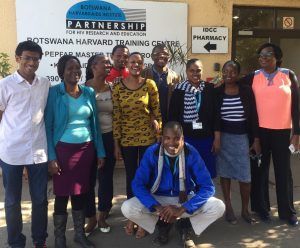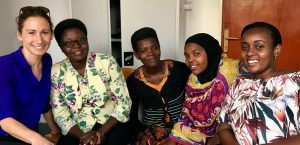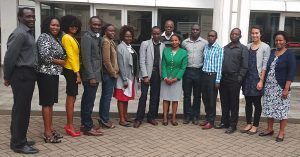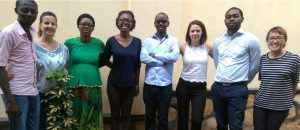Rose Traveling Fellowship Program in Chronic Disease Epidemiology and Biostatistics
Public health exists in a multi-national, multi-cultural world. With the speed of travel, and information networks, opportunities for cross-cultural exchange are widespread. Until now, opportunities in international health have been strongest in the areas of family planning and infectious disease, mainly in developing countries.
The goal of the Rose Traveling Fellowship is to give graduate students and postdocs in the Departments of Epidemiology and Biostatistics, from the Harvard T.H. Chan School of Public Health, a cross-cultural experience, which could be in a developed country or a developing country.
The Rose Traveling Fellowship Program at the Harvard Chan School provides critical financial support for students or post-doctoral scholars traveling abroad for internships, research work, or any other academically-related projects related to chronic disease epidemiology and/or biostatistics.
Applicants should submit a brief summary (1 page) in the form of a personal essay describing:
- their travel plans
- research strategy or internship objective
- the background experience and skills the applicant will bring to the project
- the skills or experiences the applicant hopes to acquire
- how the experience fits into the applicant’s overall academic and career goals
If the applicant is planning a research project, the essay should mention the research topic, hypothesis, methodology, data collection strategy in the country, and subsequent analysis planned by the applicant.
Each applicant should also submit (1) a budget and (2) a short faculty recommendation from their academic advisor or other faculty member familiar with their academic plans.
Fellowship recipients will be chosen by the chairs of the Departments of Epidemiology and Biostatistics. Candidates will be selected on the basis of academic merit, faculty recommendations, and the nature of their proposed trip. Excellence and an ability to make a difference in the world are the top criteria.
There are four $5,000 awards and three $10,000 awards available that will be given out over the course of this academic year. The grant is expected to cover the cost of airfare and other travel costs, provide a stipend for food and housing, and assist with any research expenses. There will be two deadlines during the 2023-2024 academic year: November 10, 2023, and April 12, 2024.
The award will be considered taxable income, so it is important to include taxes in the budget if you do not want to pay this out-of-pocket. Stipend payments will be made approximately two months after award decision.
Upon returning to the Harvard School of Public Health, grant recipients will be expected to provide a written summary of their experience and to be available to meet the donor when possible. In addition, the Departments of Epidemiology and Biostatistics will host an annual seminar to provide each year’s grant recipients with an opportunity to share their travel and research experiences with the larger School community.
- Proposals and questions can be sent to Allison (Aly) Hakioglu (ahakioglu@hsph.harvard.edu).
- Guidelines and Application
Recent Rose Traveling Fellows and Projects:
Fall 2023 Fellows
Jeremy Brown | Epidemiology
Advisor – Sonia Hernández-Díaz
Project Title: Evaluating the safety of medications prescribed during pregnancy in Japan
Jie (Kate) Hu | Biostatistics
Advisor – Francesca Dominici
Project Title: Theoretical Study of Bayesian Nonparametric Method to Adjust for Unmeasured Confounding with Negative Controls
LeeAnn Lucas | Epidemiology
Advisor – Lorelei Mucci
Project Title: Occupational and death registries to identify occupations associated with increased bladder cancer mortality risk
Stella Nam | Biostatistics
Advisor – Jarone Lee
Project Title: Advancing telemedicine in Pakistan: A comprehensive research initiative for healthcare equity
Emnet Sisay | Epidemiology
Advisor – Jeffrey Imai-Eaton
Project Title: Spatial analysis of HIV prevalence: Identifying high-risk communities in Malawi
Yueyang Zhang | Epidemiology
Advisor – Mingyang Song
Project Title: Comprehensive characterization of family history to improve colorectal cancer risk estimation: A national registry-based study in Sweden
Spring 2023 Fellows
Motohiko Adomi | Epidemiology
Advisor – Krista Huybrechts
Brief Project Description: Epidemiology study using pregnancy database in Japan
Simone Barry | Epidemiology
Advisor – Heather Baer
Brief Project Description: Cluster outbreak of Tuberculosis in Indigenous Australians in remote Australia
Allison LaHood | Epidemiology
Advisor – Megan Murray
Brief Project Description: Evaluating a home-based model for multidrug – resistant tuberculosis care delivery in Sierra Leone
Michelle Sodipo | Epidemiology
Advisor – Lorelei Mucci
Brief Project Description: IRONMAN – Caribbean
Elizabeth (Kate) Webb | Epidemiology
Advisor – Karestan Koenen
Brief Project Description: Impact of Socioeconomic Inequities on Resting-State Functional Connectivity and Future PTSD Symptoms in a South African Community Sample
Fall 2022 Fellows
Kathy Trang | Epidemiology
Advisor – Bizu Gelaye
Brief Project Description: The implementation of existing home-visiting and peer support programs for patients living with schizophrenia in the city and to discuss further collaborations with the Peruvian National Institutes of Mental Health (NIMH)
Tomotaka Ugai | Epidemiology
Advisor – Shuji Ogino
Brief Project Description: Differential associations of energy balance-related factors with cancer incidence and mortality in early-onset vs. later-onset cancers among Asian populations
Spring 2022 Fellows
Bryan Wilder | Epidemiology
Advisor – Grace Chan
Brief Project Description: The development of targeted interventions for pregnant women in Ethiopia.
Diana Juvinao-Quintero | Epidemiology
Advisor – Bizu Gelaye
Brief Project Description: Examining the association between preconception and late pregnancy maternal stress with secondary sex ratio (Lima, Peru)
Georgios Polychronidis | Epidemiology
Advisor – Mingyang Song
Brief Project Description: Metabolomic Profiles of Mediterranean Diet: the Epirus Health Study (Ioannina, Greece)
Larry Han | Biostatistics
Advisor – Tianxi Cai
Brief Project Description: APHP Long-COVID research project (Paris, France)
Yu Zhang | Epidemiology
Advisor – Carmen Messerlian
Brief Project Description: Preconception and prenatal environmental exposures influence the risk of cerebral palsy in children, leveraging a large population birth registry (Ottawa, Canada)
Fall 2021 Fellows
Flavia Camponovo | Epidemiology
Advisor – Caroline Buckee
Brief Project Description: Data analysis and statistics to understand drivers of malaria – Guyana, 2021
Christina Fennell | Epidemiology
Advisor – Roger Shapiro
Brief Project Description: Quality assurance/quality control of the Tsepamo Surveillance Study (Gaborone, Botswana)
Michelle Mens | Epidemiology
Advisor – Julia Wu
Brief Project Description: Immunological aging clock for predicting chronic diseases and its epigenetic links (Rotterdam, the Netherlands)
Clara Pons Duran | Epidemiology
Advisor – Grace Chan
Brief Project Description: To carry out a study that could prevent Ethiopian children from developing severe chronic health conditions (Addis Ababa, Ethiopia)
Avik Ray | Epidemiology
Advisor – Julie Lauffenburger
Brief Project Description: Evaluation of using personalized, one-way mobile phone text message reminders to improve adherence to ART among adolescents and young adults living with HIV in Nigeria
Yuchen Zhao | Epidemiology
Advisor – Peter Kraft
Brief Project Description: Genome-wide association studies (Nanjing, China)
Fall 2019 Fellows
Linda Harrison | Biostats
Advisor – Rui Wang
Brief Project Description: Sample Size Calculation for a HIV Pre-Exposure Prophylaxis (PrEP) Clinical Trial in Thailand
Inga Holmdahl | Epidemiology
Advisor – Caroline Buckee
Brief Project Description: Informing sampling design for surveillance of mosquito vectors in Columbia and Guyana.
Gabriel Loewinger | Biostats
Advisor – Giovanni Parmigiani
Brief Project Description: A longitudinal study to assess the effectiveness of Takiwasi, a drug treatment center in Peru.
Emma McGee | Epidemiology
Advisor – Heather Eliassen
Brief Project Description: Body fat distribution by computed tomography and breast cancer risk in the AGES-Reykjavik Study: A research study and pedagogic practice in Iceland.
Spring 2019 Fellows
Benjamin Fu | Epidemiology
Advisor – Lorelei Mucci
Brief Project Description: Collaboration within the AGES-Reykjavik Study on sex disparities in cancer risk and using omics datasets to study cancer epidemiology.
Elizabeth Hentschel | Biostats
Advisor – Bethany Hedt-Gauthier
Brief Project Description: D-Tree International Safer Deliveries Program Summer Research Internship.
Pamela Martinez Vargas | Epidemiology
Advisor – Caroline Buckee
Brief Project Description: Big data and health, Bangladesh 2019: Data analytics for making health policies.
Christine Tedijanto | Epidemiology
Advisor – Grace Chan
Brief Project Description: Maternal and Newborn Colonization and Antimicrobial Resistance (MNC-AMR)
Jiaxi Yang | Epidemiology
Advisor – Wafaie Fawzi
Brief Project Description: Evaluating Screening Tool for Gestational Diabetes Mellitus in Tanzania
Fall 2018 Fellows
Karmel Choi | Postdoc in Epidemiology
Advisor – Karestan Koenen
Brief Project Description: Genetically informed research on trauma and mental health to diverse cross-cultural settings, particularly those currently underrepresented in published work.
Aisha Dickerson | Postdoc in Epidemiology-EH
Advisor – Marc Weisskopf
Brief Project Description: Investigate association between lifetime parental occupational exposures to bioaccumulative and mutagenic toxicants and the risk of autism spectrum disorder (ASD diagnosis in offspring.
Brenna Kirk | SM2 in Epidemiology
Advisor – Lindsay Jaacks
Brief Project Description: Inform health promotion policies to prevent malnutrition and chronic disease by understanding access to fresh vegetables and fruits in complex urban food systems in the developing world.
Joy Shi | Doctoral Student-Population Health Sciences in Epidemiology
Advisor – Miguel Hernan
Brief Project Description: Application of casual inference methods to enhance the current state of knowledge regarding chronic disease etiology and inform intervention strategies to improve public health.
Aaron Sonabend | Doctoral Student in Biostatistics
Advisor – Tianxi Cai
Brief Project Description: Develop a medical-concept transfer-learning tool for French and US EHR (Electronic Health Records) data, as a first step towards developing a global resource for health research.
Spring 2018 Fellows
Leah Comment | Doctoral Candidate in Biostatistics
Advisor – Corwin Zigler
Brief Project Description: Causal inference methods for non-mortality outcomes
Xia Jiang | Postdoc in Epidemiology
Advisor – Peter Kraft
Brief Project Description: Reproductive Factors and Risk of Multiple Sclerosis: A Mendelian Randomization Approach to Understand Disease Etiology and Sex Disparity
David Sasson | Master’s Candidate in Biostatistics
Advisor – Heather Mattie
Brief Project Description: Organize two health datathons in Singapore and Philippines with MIT’s Critical Data group
Melissa Sutton | Master’s of Public Health Candidate in Epidemiology
Advisor – Heather Baer
Brief Project Description: Risk factors for Buruli Ulcer in an endemic region of Benin: Can high-risk water exposure and water-use activities be identified to guide a preventive public health strategy?
Reem Waziry | Postdoc in Epidemiology
Advisor – Albert Hofman
Brief Project Description: Risk of Early Dementia Among Stroke Survivors: An International Epidemiology Approach
Zhaozhong Zhu | Postdoc in Epidemiology
Advisor – Liming Liang
Brief Project Description: Epigenome-wide association study (EWAS) of IGA neuropathy in B-cells with collaborators at Sun Yat-sen University
Fall 2017 Fellows
Onella Dawkins | Master’s of Public Health Candidate in Epidemiology
Advisor – Goodarz Danaei
Brief Project Description: The impact of psycho-social factors on cardiovascular health in urban poor and middle income communities in Jamaica
Yuan Ma | Postdoc in Epidemiology
Advisor – Albert Hofman
Brief Project Description: Investigating the role of blood pressure, particularly its variability, in the pathology of dementia
Katharine Robb | Doctoral Candidate in Biostatistics
Advisor: Bethany Hedt-Gauthier
Brief Project Description: Water, Sanitation, and Hygiene Conditions and their Association with Maternal and Neonatal Health in a Hospital in Rural Rwanda
Gyeyoon Yim | Doctoral Candidate in Epidemiology
Advisor: Marc Weisskopf
Brief Project Description: Mothers and Children’s Environmental Health (MOCEH) Study & Korean Children’s Environmental Health Study (Ko-CHENS)
Spring 2017 Fellows
Isabel Fulcher | Doctoral Candidate in Biostatistics
Advisor – Bethany Hedt-Gauthier
Brief Project Description: D-tree International Internship in Zanzibar, Tanzania
Hari Iyer | Doctoral Candidate in Epidemiology
Advisor – Wafaie Fawzi
Brief Project Description: Work to support Potlako, a health systems intervention aimed at reducing the time to diagnosis among cancer patients in the East Kweneng District of Botswana
Ruoran Li | Doctoral Candidate in Epidemiology
Advisor – Lindsay Jaacks
Brief Project Description: Formative Research to Inform a Hospital Canteen Intervention to Promote Health in China
Eleanor Murray | Postdoc in Epidemiology
Advisor – Miguel Hernan
Brief Project Description: Erasmus University Visit to study agent-based models (ABMs) for assessing complex exposures
Sara Sauer | Doctoral Candidate in Biostatistics
Advisor – Bethany Hedt-Gauthier
Brief Project Description: Develop a Design to Evaluate The All Babies Count (ABC) Initiative, a program used to help eliminate preventable neonatal deaths, in Rwanda
Aimee Taylor | Postdoc in Epidemiology
Advisor – Caroline Buckee
Brief Project Description: Applying Biostatistical Models to Malaria Data from Thailand
Fall 2016 Fellows
Caitlin Chan | Master’s of Public Health Candidate in Epidemiology
Advisor – Theresa Betancourt
Brief Project Description: Work with The Strong Families, Thriving Children study to build an evidence-based model for ECD programming among families living in extreme poverty in Rwanda
Georgia Papadogeorgou | Doctoral Candidate in Biostatistics
Advisor – Corwin Zigler & Francesca Dominici
Brief Project Description: Causal Inference for Air Pollution Research in Italy
Farah Qureshi | Doctoral Candidate in Social & Behavioral Sciences
Advisor – Albert Hofman & Laura Kubzansky
Brief Project Description: Data Analysis of the Generation R Project at Erasmus Medical Center
Hillary Topazian | Master’s of Public Health Candidate in Epidemiology
Advisor – George Seage
Brief Project Description: Cervical Cancer Treatment and Cancer Surveillance in Kenya
Christine Ulysse | Master’s Candidate in Biostatistics
Advisor – Rebecca Betensky
Brief Project Description: Analyzing mother to child HIV transmission data in Brazil
Student Project Reflections:
 Hari Iyer states that he “had the privilege of being awarded the Rose Traveling Fellowship to work with investigators from the Botswana-Harvard AIDS Institute Partnership (BHP) and Harvard Chan School of Public Health (HCSPH) in Gaborone. This team is attempting to understand how the AIDS epidemic could influence rising cancer rates in Botswana. Fresh off of two years of epidemiologic methods and applied analysis coursework at the Chan School, I felt ready to contribute. My primary objective was supporting the ‘Potlako’ (‘hurry’ in the local language, Setswana) initiative to reduce delays in diagnosis and treatment initiation among cancer patients. I worked with Dr. Scott Dryden-Peterson and Dr. Neo Tapela to develop an analysis plan for the impact evaluation. Spending time on the ground allowed me to get to know the research team, who are responsible for data entry and following up with patients and providers to ensure that appointments are scheduled, laboratory results are communicated, and patients have the information and support they need to get their cancer care. We were able to refine reports to ensure that research staff were notified when patients or providers needed to be contacted to provide timely updates on care”.
Hari Iyer states that he “had the privilege of being awarded the Rose Traveling Fellowship to work with investigators from the Botswana-Harvard AIDS Institute Partnership (BHP) and Harvard Chan School of Public Health (HCSPH) in Gaborone. This team is attempting to understand how the AIDS epidemic could influence rising cancer rates in Botswana. Fresh off of two years of epidemiologic methods and applied analysis coursework at the Chan School, I felt ready to contribute. My primary objective was supporting the ‘Potlako’ (‘hurry’ in the local language, Setswana) initiative to reduce delays in diagnosis and treatment initiation among cancer patients. I worked with Dr. Scott Dryden-Peterson and Dr. Neo Tapela to develop an analysis plan for the impact evaluation. Spending time on the ground allowed me to get to know the research team, who are responsible for data entry and following up with patients and providers to ensure that appointments are scheduled, laboratory results are communicated, and patients have the information and support they need to get their cancer care. We were able to refine reports to ensure that research staff were notified when patients or providers needed to be contacted to provide timely updates on care”.
 Katharine Robb states that the Rose Traveling Fellowship “[Provided] the opportunity to travel to Rwanda to study the water, sanitation, and hygiene (WASH) conditions within a rural district hospital and the surrounding community. I developed and implemented a sub-study which sought to characterize the variability in WASH conditions to which patients are exposed and investigate how WASH influences maternal health. The sub-study was nested within a larger study examining the prevalence and risk factors for surgical site infection following caesarian section, which is led by Drs. Bethany Hedt-Gauthier and Robert Riviello of Harvard’s Department of Global Health and Social Medicine and Dr. Fred Kateera of Partners In Health. The experience allowed me to practice the methodological and leadership skills I’d learned through my coursework in the Doctor of Public Health (DrPH) program while building relationships with and learning from the study team in Rwanda”.
Katharine Robb states that the Rose Traveling Fellowship “[Provided] the opportunity to travel to Rwanda to study the water, sanitation, and hygiene (WASH) conditions within a rural district hospital and the surrounding community. I developed and implemented a sub-study which sought to characterize the variability in WASH conditions to which patients are exposed and investigate how WASH influences maternal health. The sub-study was nested within a larger study examining the prevalence and risk factors for surgical site infection following caesarian section, which is led by Drs. Bethany Hedt-Gauthier and Robert Riviello of Harvard’s Department of Global Health and Social Medicine and Dr. Fred Kateera of Partners In Health. The experience allowed me to practice the methodological and leadership skills I’d learned through my coursework in the Doctor of Public Health (DrPH) program while building relationships with and learning from the study team in Rwanda”.
Hillary Topazian tells us how the Rose Traveling Fellowship “allowed me to work with the Treatment, Research, and Expert Education (TREE) program run by the University of Washington in Nairobi, Kenya. Our research follows women with HIV who were diagnosed with cervical dysplasia and treated with loop electrosurgical excision procedure (LEEP). Although outcomes of this treatment have been successful in low- and middle-income countries, it is still unknown how these figures compare in HIV positive women. I also continued an analysis with Kenya’s National Cancer Registry, analyzing data with my previous co-workers on cancer cases and incidence rates from the Nairobi Registry. This was a wonderful opportunity to work with research staff in person and gain a deeper understanding of the purpose behind the research question and the relevance to the Kenyan context.”
tells us how the Rose Traveling Fellowship “allowed me to work with the Treatment, Research, and Expert Education (TREE) program run by the University of Washington in Nairobi, Kenya. Our research follows women with HIV who were diagnosed with cervical dysplasia and treated with loop electrosurgical excision procedure (LEEP). Although outcomes of this treatment have been successful in low- and middle-income countries, it is still unknown how these figures compare in HIV positive women. I also continued an analysis with Kenya’s National Cancer Registry, analyzing data with my previous co-workers on cancer cases and incidence rates from the Nairobi Registry. This was a wonderful opportunity to work with research staff in person and gain a deeper understanding of the purpose behind the research question and the relevance to the Kenyan context.”
Caitlin Chan states that as a Rose Traveling Fellow “I was able to travel to Kigali, Rwanda, to work on the implementation of a randomized controlled trial of a psychosocial early childhood development program for families living in extreme poverty. The project is led by Professor Theresa Betancourt, Associate Professor of Child Health and Human Rights at the Harvard Chan School, and run through the Research Program on Children and Global Adversity. I developed a training program with the input and expertise of Dr. Aisha Yousafzai at the Harvard Chan School, Dr. Silvia Koller at the Harvard Graduate School of Education, and the research and implementation team at FXB Rwanda, to be used to teach community volunteers how to lead an intensive, 10-month home-visiting program to families with young children enrolled in the government public works program. The field visit allowed for intensively collaborative exercise in program development that would not be possible otherwise. It connected me to the social, cultural and political landscape of Rwanda and strengthened my understanding of the unique implications and possibilities of the results of this project for evidence-based practice in East Africa and beyond. The Rose Fellowship provided me with valuable global health experience to complement the quantitative and classroom-based learning of my program.”
states that as a Rose Traveling Fellow “I was able to travel to Kigali, Rwanda, to work on the implementation of a randomized controlled trial of a psychosocial early childhood development program for families living in extreme poverty. The project is led by Professor Theresa Betancourt, Associate Professor of Child Health and Human Rights at the Harvard Chan School, and run through the Research Program on Children and Global Adversity. I developed a training program with the input and expertise of Dr. Aisha Yousafzai at the Harvard Chan School, Dr. Silvia Koller at the Harvard Graduate School of Education, and the research and implementation team at FXB Rwanda, to be used to teach community volunteers how to lead an intensive, 10-month home-visiting program to families with young children enrolled in the government public works program. The field visit allowed for intensively collaborative exercise in program development that would not be possible otherwise. It connected me to the social, cultural and political landscape of Rwanda and strengthened my understanding of the unique implications and possibilities of the results of this project for evidence-based practice in East Africa and beyond. The Rose Fellowship provided me with valuable global health experience to complement the quantitative and classroom-based learning of my program.”



